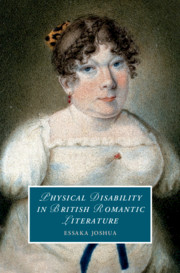‘Joshua uses writing about disability and disability theory to bring a new perspective to her analysis of these texts. As a result, this is an important contribution to literary criticism of the Romantic era. There is a larger historical significance too in her careful reading of the nuance of language and the evolution of terminology we use in our discussions of disability history.’
Rosamund Oates
Source: H-Disability
‘Joshua’s book demonstrates the need for scholars studying topics as wide-ranging as Jacobin politics and novels, proto-feminist writing, the Romantic encounter poem, aesthetics, the marriage plot, and the gothic to develop and account for historically specific concepts of pre-disability.’
Corey Goergen
Source: The Wordsworth Circle
‘It is steeped in the intricate minutiae of period-specific group terms around the modern concept of disability. This book has succeeded wonderfully in making the most out of those archival silences in disability history … The greatest contribution of this book is to deepen our understanding of the long history of representation by offering a detailed peek into the unfamiliar language of Romantic-era disability. The historicist warning, however, is well-taken, and writing the history of disabled people will continue to require both Joshua’s corrective archive and Sharpe’s reparative anachronism.’
Fuson Wang
Source: European Romantic Review
‘… a deeply researched and thought-provoking examination of Romantic-era representations of physical impairment and nonimpairment.’
Paul Kelleher
Source: Modern Philology
‘Physical Disability is likely to be a foundational text for Romantic disability studies going forward.’
Hannah Chaskin
Source: Keats-Shelley Journal
‘... prompts us to more fully and clearly explain how disability emerges and flourishes in literature before the twentieth century.'
Paul Kelleher
Source: Modern Philology
‘… suggests a road map for Romanticists wishing to delve into the historical relation between disability and the literature of that time. Joshua’s study is a salutary reminder of what might be gained or lost by ongoing approaches (including my own) not shying away from a presentism reading the archives of the nineteenth century or earlier.’
Orrin N. C. Wang
Source: SEL Studies in English Literature 1500–1900



